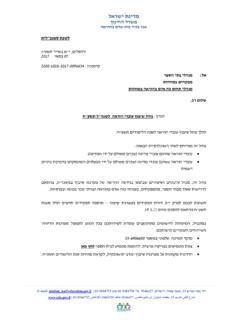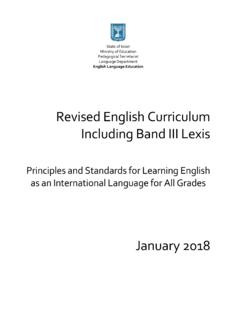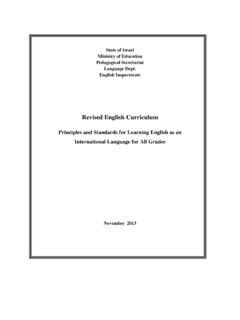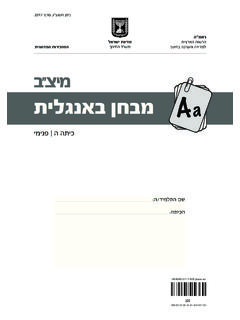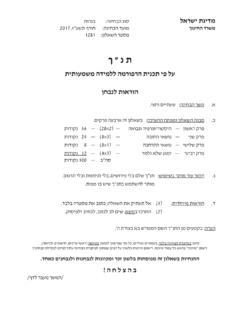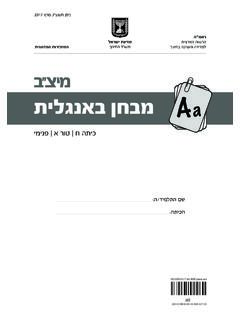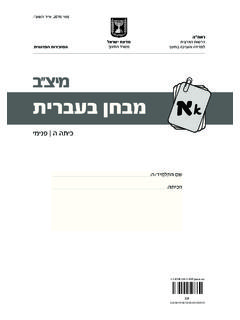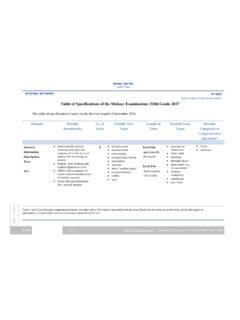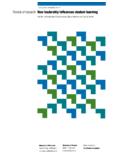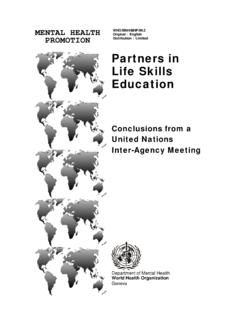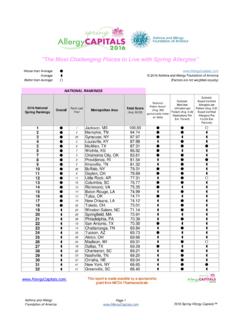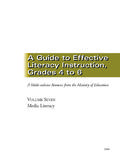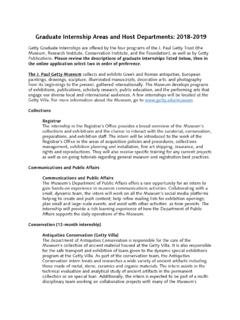Transcription of (Divided into 70% and 30% for All Grade Levels ...
1 State of Is rae l Minis try of education Pe dagogical Se cre tariat Language De pt. Englis h Ins pe ctorate Revised English Curriculum ( divided into 70% and 30% for All Grade Levels ) Principles and Standards for Learning English as an International Language for All Grades Nove mbe r 2013 Acknowle dge ments Thanks to the English Curriculum Committee for preparing the draft version which later served as a blueprint for this document: Dr. Judy Steiner, Chief Inspector for English Language education , Oranim, Academic College of education Prof. Lily Orland, Chairperson, Dean, Faculty of education , Haifa University.
2 Dr. Sarah Schrire, Chairperson, Curriculum Committee. Head of ICT Unit, Kibbutzim College of education Dr. Lisa Amdur, Coordinator, Curriculum Committee, Ministry of education Mdalale Azzam - Abu Saleem Salman Al-Sheikh Junior High School, Abu Snan Dr. Elisheva Barkon, Head of English Department Oranim, Academic College of education Amanda Caplan, De Shalit School; Teacher trainer, Ministry of education Ora Gvirsman, English Coordinator, Hadar School, Raanana Nira Hecht " Dr. Michele Horowitz, Head of English Language education , Levinsky College Fahed Jeries, Makif ORT Tarchiha Debbie Lahav, NCJWR Institution for Innovation in education , Hebrew University Dr.
3 Debbie Lifschitz, Michlalah Jerusalem College Chava Shatsky, Thanks to the following people for their academic and field-based consultation: Sigalit Arditi - National Counselor, ICT Elaine Coleman, Oranim Academic College of education Prof. Elinor Saiegh-Haddad, English Department (Linguistics Division), Bar-Ilan University Dr. Janina Kahn-Horwitz, Oranim Academic College of education ; Edmond J. Safra Brain Research Center for the Study of Learning Disabilities, University of Haifa Prof. Batia Laufer, Department of English Language and Literature, University of Haifa Dr. Tina Waldman, Vocabulary Consultant, Kibbutzim College of education Dr.
4 Zofia Yoed, Head of Curriculum Dept., Ministry of education Thanks to the following people for their contribution to the revision and final version of the current document: Idit Bar Curriculum Development, Language Dept., Ministry of education Dr. Miriam Kluska, Ministry of education ; Achva College Tzilla Miron-Eylon, Acting Head of Language Dept., Ministry of education Dr. Shoshana Plavin, Ministry of education ; Talpiot Academic College Prof. Penny Ur, Oranim Academic College of education . Table of Contents 5 Rationale for Updating the Curriculum .. 6 Ove rvie w of Docume nt.
5 7 Se ction One : 7 A. Principles underlying meaningful language learning and langua ge 8 B. Principles underlying teaching the beginning stages of language acquisition (Pre- Foundation Leve l Stages One and Two) ..11 C. Principles underlying the choice of materials ..12 D. Principles underlying the choice and design of tasks ..12 E. Principles underlying c lassroom F. Princ iples underlying the integration of Information Communications Technology (ICT) ..14 Se ction Two: Ove rvie w of the Brief 15 A. B. C. Levels ..17 D. Se ction Thre e : Highe r-Orde r Thinking Skills (HOTS)..18 Se ction Four: Compone nts of Language Te A.
6 B. Grammar ..20 Se ction Five : Be nchmarks for the Pre-Foundation Leve l Stages One and Two ..21 Se ction Six: Standards , Le ve ls of Progress ion and Be nchmarks for All Leve ls ..22 Doma in of Soc ia l Interaction ..23 Doma in of Access to Information ..25 Doma in of Presentation ..27 Doma in of Apprec iation of Language , Literature and Culture ..29 Se ction Se ve n: Domains , Benchmarks , Te xt Characte ris tics , Higher-Orde r Thinking Skills Lexis , and Grammar for Each Le vel ..32 Foundation Leve l ..33 Intermediate Leve l ..46 Profic iency Leve l ..60 Se ction Eight: Ke y Compone nts in the Te aching of Lite Se ction Nine : Le arne r Dive rs ity.
7 69 Se ction Te n: Recomme ndations for Imple me nting the Curriculum ..70 Background Re ading ..71 5 Introduct io n Perhaps the most dramatic development that has taken place in the field of English language teaching in the last generation has been the shift in its primary function: from being the native language of nations, such as the UK or USA, to being mainly a global means of communication. The speakers of English whose mother tongue is another language already vastly outnumber the English native speakers, and their relative number continues to grow. For most of its learners, English is therefore no longer a foreign language ( one that is owned by a particular other nation or ethnic group) but first and foremost an international language (one that has no particular national owner).
8 One of the crucial implications of this development is the increased importance for all of a knowledge of English. Speakers of Hebrew or Arabic will need to be able to use both spoken and written English in order to progress in their professional, business or academic careers, as well as in order to travel, enjoy international entertainment, or take advantage of the opportunities offered by the Internet. The effective teaching of English thus takes high priority, necessitating a larger number of teaching hours, well-trained teachers, a carefully planned curriculum, attractive and learning-rich materials, and the setting of high standards for assessment.
9 The English Curriculum in Israel sets out the expected standards for the teaching of English in Israel, in schools under the supervision of the Ministry of education . This includes all sectors: secular, religious, Arab, Druze, and Bedouin. The document is an important contributor to classroom teaching; it will also be used to inform teacher trainers and materials and test writers, as shown in the table below. Targ e t A udie nc e s Po s s ible U s e s Teachers unit planning integrating classroom testing and teaching developing tables of specification for classroom testing adapting materials mapping out additional tasks Teacher Trainers training teachers in the implementation of the mapping process and the use of the checklists Material and Test Writers developing materials and tests 6 Rationale for Updating the Curric ulu m Research in foreign language acquisition and insights from the field during the last decade have set new challenges for EFL teaching.
10 Learning and assessment, requiring an in-depth re-examination of the English Curriculum Principles and Standards for Learning English as a Foreign Language published in 2001. As a result of this process, it was decided to revise and expand the document, resulting in a curriculum that will better address the needs of teachers, material writers and test designers. The following new components have been integrated into the curriculum: Benchmarks for teaching English at the Pre-Foundation Level, in order to facilitate the teaching of the beginning stages of language acquisition to younger learners.

